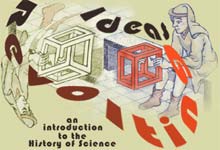
University of California, Irvine
Instructor: Dr. Barbara J. Becker

|
Quodlibet 1. By any other name...?
| |
|
|
|
In the following essay, Victorian polymath William Whewell (1794-1886) publicized a new word he had coined to describe individuals who devote their lives to investigating the natural world. "Natural philosopher" and "man of science" were old-fashioned terms; "scientist," he suggested, would be more fitting in a modern age. Sixty years later, Thomas Henry Huxley (1825-1895), wrote to a colleague: "To any one who respects the English language, I think 'Scientist' must be about as pleasing a word as 'Electrocution.'" It takes a while for some things to catch on. |
The tendency of the sciences has long been an increasing proclivity of separation and dismemberment. The mathematician turns away from the chemist; the chemist from the naturalist; between the mathematician and the chemist is to be interpolated a 'physicien' (we have no English name for him), who studies heat, moisture and the like. And thus science, even mere physical science, loses all trace of unity. A curious illustration of this result may be observed in the want of any name by which we can designate the students of the knowledge of the material world collectively. We are informed that this difficulty was felt very oppressively by the members of the British Association for the Advancement of Science, at their meetings at York, Oxford and Cambridge, in the last three summers. There was no general term by which these gentlemen could describe themselves with reference to their pursuits. Philosophers was felt to be too wide and lofty a term, and was very properly forbidden them by Mr [Samuel Taylor] Coleridge, both in his capacity of philologer and metaphysician; savans was rather assuming, besides being French instead of English; some ingenious gentleman [Whewell, himself!] proposed that, by analogy with artist, they might form scientist, and added that there could be no scruple in making free with this termination when we have such words as sciolist [one who knows only superficially], economist, and atheist--but this was not generally palatable; others attempted to translate the term by which the members of similar associations in Germany have described themselves, but it was not found easy to discover an English equivalent for Natur-Forscher [one who conducts research on Nature]. The process of examination which it implies might suggest such undignified compounds as nature-poker, or nature-peeper; but these were indignantly rejected.
|
It has been nearly two hundred years since Whewell first introduced
the name "scientist."
|
|